Schwein is a music group comprising members of Buck-Tick, KMFDM, and Pig. Members Raymond Watts and Hisashi Imai, both having worked together in Schaft, were joined by Atsushi Sakurai, Sascha Konietzko and Lucia Cifarelli. In 2001 Schwein released an album, Schweinstein, which peaked at number 18 on Oricon's album chart, followed by the remix album Son of Schweinstein. Schwein toured Japan in the summer of 2001. However, Konietzko did not tour with them, citing illness and a desire to focus on KMFDM. In a 2023 interview with Visual Music Japan, Raymond Watts talked about the project and cited Schwein as his favorite collaboration to date and called Sakurai a "grand vocalist".

Mona Lisa Overdrive is the 13th album by Buck-Tick, released on February 13, 2003. The album title is mistakenly thought to have been inspired by William Gibson's cyberpunk novel of the same name but guitarist Hisashi Imai originally confused it with Robert Longo's work Samurai Overdrive, which inspired the album title. It reached number seven on the Oricon chart with 31,235 copies sold. The album is thematically connected to the previous release, Kyokutou I Love You: the last instrumental song in Kyokutou I Love You gives the musical foundation to the first song in Mona Lisa Overdrive, while the base of the last song of this album recurs in the first song of Kyokutou I Love You.

Taboo is the fourth studio album by the Japanese rock band Buck-Tick. It was released on cassette, CD and as a two-record vinyl set on January 18, 1989, through Victor Entertainment. Taboo was digitally remastered and re-released on September 19, 2002, with two bonus tracks. It was remastered and re-released again on September 5, 2007. "Angelic Conversation" was re-recorded as the b-side to the group's single "M・A・D" in 1991. "Just One More Kiss", "Iconoclasm" and "Taboo" were later re-recorded for the compilation album Koroshi no Shirabe: This Is Not Greatest Hits (1992). "Iconoclasm" was covered by J for the Buck-Tick tribute album, Parade -Respective Tracks of Buck-Tick- (2005). Taboo peaked at number one on the Oricon charts, selling 298,620 copies in the first year, and at least 300,000 in total.

Aku no Hana is the fifth studio album by the Japanese rock band Buck-Tick. It was released on cassette and CD on February 1, 1990, through Victor Entertainment. It peaked at number one on the Oricon charts and is the group's best-selling album to date. It was certified gold in the month of its release, and sold 435,080 copies in the first year of its release. The title comes from Charles Baudelaire's volume of poetry, Les Fleurs du mal.

Six/Nine is the eighth studio album by the Japanese rock band Buck-Tick. It was released in a clear purple case on May 15, 1995, through Victor Entertainment.

Sexual XXXXX! is the second studio album by the Japanese rock band Buck-Tick. It was the group's major label debut and was released on vinyl, cassette and CD on November 21, 1987 through on Victor Entertainment. The album was digitally remastered and re-released on September 19, 2002, with a different cover. Sexual XXXXX! was remastered and re-released again on September 5, 2007. The songs "Do the I Love You" and "Hyper Love" were later re-recorded for the band's compilation album Koroshi no Shirabe: This Is Not Greatest Hits (1992). "My Eyes & Your Eyes" was also re-recorded for the b-side to their "Rendezvous" single in 2007. At the time of its release, the album peaked at number 33 on the Oricon charts and as of 2011, has sold 40,000 copies.

Seventh Heaven is the third studio album by the Japanese rock band Buck-Tick. It was released on vinyl, cassette and CD on June 21, 1988, through Victor Entertainment, and has been certified gold by the RIAJ for sales over 100,000 copies. The album was digitally remastered and re-released on September 19, 2002, with two bonus tracks. It was remastered and re-released again on September 5, 2007. The lyrics for "Physical Neurose" mention Gregor Samsa, the main character of Franz Kafka's The Metamorphosis. "...In Heaven...", "Oriental Love Story" and "Victims of Love" were later re-recorded for the group's compilation album Koroshi no Shirabe: This Is Not Greatest Hits (1992). Seventh Heaven peaked at number three on the Oricon charts, and 1st on the LP chart; it has sold 110,000 copies.
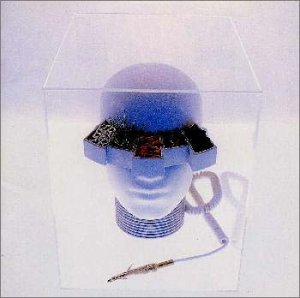
Sexy Stream Liner is the tenth album by Buck-Tick, their first on Mercury Music Entertainment, released on December 10, 1997. It reached number four on the Oricon chart with 78,820 copies sold. Starting with this album, Hisashi Imai started using the theremin in their sound. Like their previous album, Sexy Stream Liner is very influenced by the cyberpunk subculture.
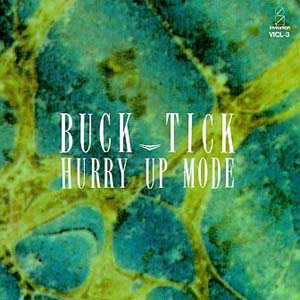
Hurry Up Mode is a remix album by Buck-Tick, released on February 8, 1990. It is composed of different versions of every song on their 1987 debut album Hurry Up Mode, except the two CD-exclusive bonus tracks. It reached number one on the Oricon chart, selling 212,430 copies. The album was digitally remastered and re-released on February 19, 2002, with two different bonus tracks. It was remastered and re-released again on September 5, 2007. "Moon Light" was later re-recorded once again for their 1992 compilation album Koroshi no Shirabe This Is Not Greatest Hits.

Darker Than Darkness: Style 93 is the seventh studio album by the Japanese rock band Buck-Tick. It was released on June 23, 1993, through Victor Entertainment. The album peaked at number two on the Oricon chart, became a certified gold seller by July 1993, and subsequently sold 213,260 copies. Darker Than Darkness: Style 93 was digitally remastered and re-released on September 19, 2002, with two bonus tracks. It was remastered and re-released again on September 5, 2007. "Dress" was remixed and used as the opening theme for the anime Trinity Blood (2005), this version was also released as a single. The album was named one of the top albums from 1989 to 1998 in a 2004 issue of the music magazine Band Yarouze.
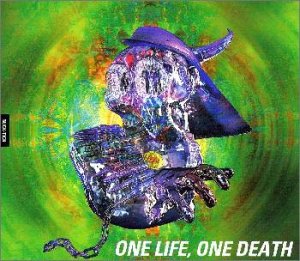
One Life, One Death is the 11th album by Buck-Tick and their first on BMG/Funhouse, released on September 20, 2000. The title comes from lyrics to "Cyborg Dolly: Sora-mimi: Phantom", which also mentions cloning sheep and is named after the famous Dolly. It reached number eleven on the Oricon chart with 30,170 copies sold. Starting from this album, Hisashi Imai started using computers when composing and he stated that he struggled to produce the sound he imagined.

Romanesque is the debut extended play released by the Japanese rock band Buck-Tick. It was released on 12-inch vinyl, cassette and 8 cm CD on March 21, 1988, through Victor Entertainment. The extended play peaked at number twenty on the Oricon charts and has sold 40,000 copies worldwide.

Tenshi no Revolver is the fifteenth studio album by Japanese rock band Buck-Tick, released by BMG Japan on September 19, 2007. The group deliberately focused on melody and adopted a straight rock "band sound" for the album. Preceded by the singles "Rendezvous" and "Alice in Wonder Underground", Tenshi no Revolver reached number five on the Oricon Albums Chart. Buck-Tick continued the musical approach they adopted on this album for their next two as well, Memento Mori (2009) and Razzle Dazzle (2010).

Kurutta Taiyou is the sixth studio album by the Japanese rock band Buck-Tick. It was released on cassette and CD on February 21, 1991, through Victor Entertainment. The album was digitally remastered and re-released on September 19, 2002, with two bonus tracks. It was remastered and re-released again on September 5, 2007. "Speed", "M・A・D" and "Jupiter" were later re-recorded for the group's compilation album Koroshi no Shirabe: This Is Not Greatest Hits (1992).

Koroshi no Shirabe: This Is Not Greatest Hits is the first compilation album released by the Japanese rock band Buck-Tick. It was released on cassette and CD on March 21, 1992, through Victor Entertainment. All of the tracks on the compilation were re-recorded and contain different musical arrangements, because of this some argue that it is a studio or remix album. The album was digitally remastered and re-released on September 19, 2002, with a bonus track. It was remastered and re-released again on September 5, 2007. Koroshi no Shirabe: This Is Not Greatest Hits peaked at number one on the Oricon charts. It was certified gold in April 1992, and has sold 338,000 copies.

Kyokutou I Love You is the 12th album by Buck-Tick, released on March 6, 2002. It reached number twelve on the Oricon chart with 28,770 copies sold. "21st Cherry Boy" contains some lyrics from T.Rex's "20th Century Boy". The album is thematically connected to the next release, Mona Lisa Overdrive: the last instrumental song in Kyokutou I Love You gives the musical foundation to the first song in Mona Lisa Overdrive, while the base of the last song of that album recurs in the first song of Kyokutou I Love You.
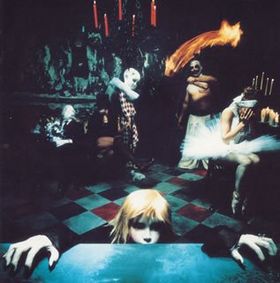
Juusankai wa Gekkou is the fourteenth album by Japanese rock band Buck-Tick, released on April 5, 2005.
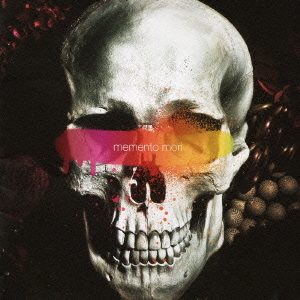
Memento Mori is the sixteenth album by Japanese rock band Buck-Tick, released on February 18, 2009. The limited edition came with a DVD of the making of the album. It reached number seven on the Oricon chart with 23,410 copies sold.

Yume Miru Uchuu is the 18th studio album by Japanese rock band Buck-Tick, released on September 19, 2012. It is their first on their own record label Lingua Sounda, which was founded the previous year. The album reached the number 14 position on the Oricon chart and number 12 on Billboard Japan, selling 19,807 copies.
"Dress" is the seventh single by Japanese rock band Buck-Tick, released on May 21, 1993. The song was written by vocalist Atsushi Sakurai, composed by guitarist Hidehiko Hoshino, and produced by the band themselves. It was the first single released off of their seventh studio album Darker Than Darkness -Style 93-, which was released a month later. It reached number 5 on the Oricon Singles Chart. It is band's fourth best-selling single, with over 171,000 copies sold.


















